
|
Getting your Trinity Audio player ready...
|
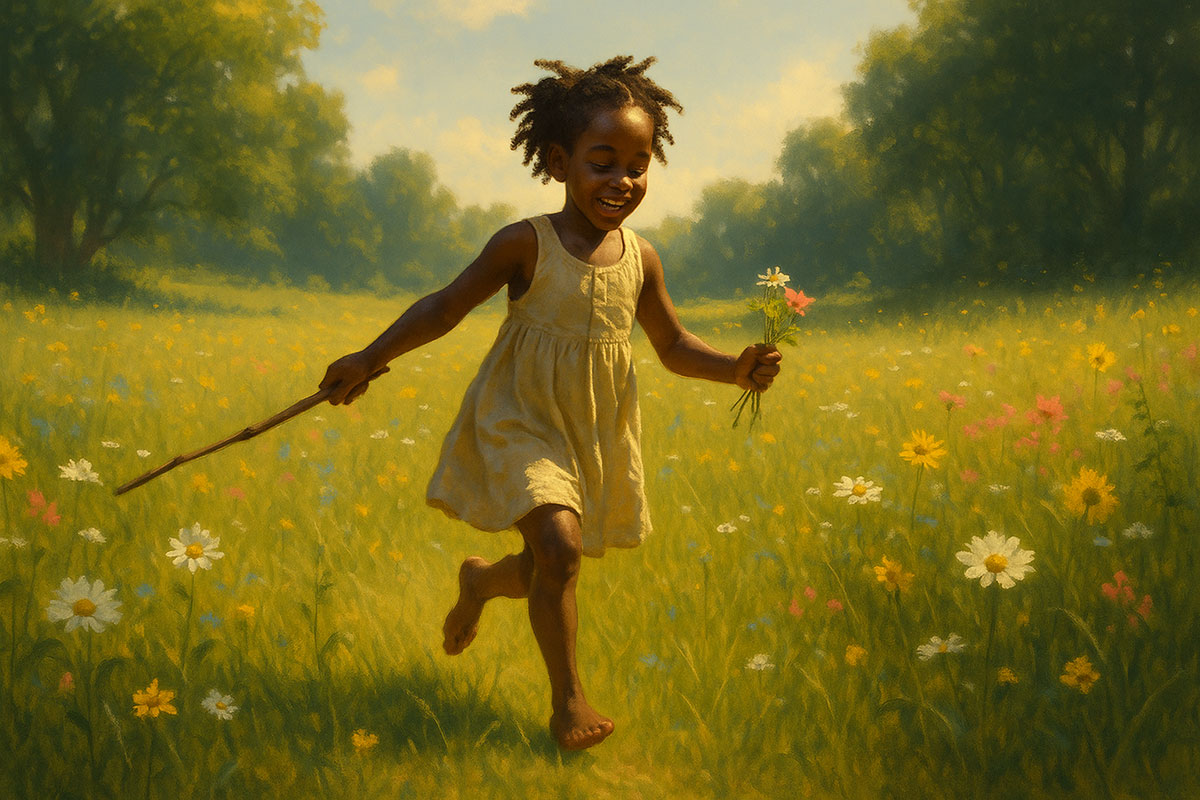
What happened to the little girl after losing her innocence in Alice Walker’s The Flowers? That haunting question lingers after the story’s final line: “And the summer was over.” Alice Walker gave us a glimpse of childhood shattered by the discovery of racial violence, but she left Myop at the edge of silence — a child marked forever by what she had seen.
This play dares to imagine what comes after. It unfolds the unspoken story of Myop’s awakening, not only to the cruelty of history but also to the hidden grief within her own family. In these five scenes, innocence gives way to recognition, silence to memory, and memory to legacy. What begins as a child’s private shock expands into a communal act of remembrance — one that binds past, present, and future.
At its heart, this play is not simply about loss, but about the power of remembering. Myop’s journey shows us that even when history tries to bury truth, the next generation has the courage to uncover it, to name it, and to carry it forward.
(Note: This is an imaginary conversation, a creative exploration of an idea, and not a real speech or event.)

Scene 1 — The End of Summer
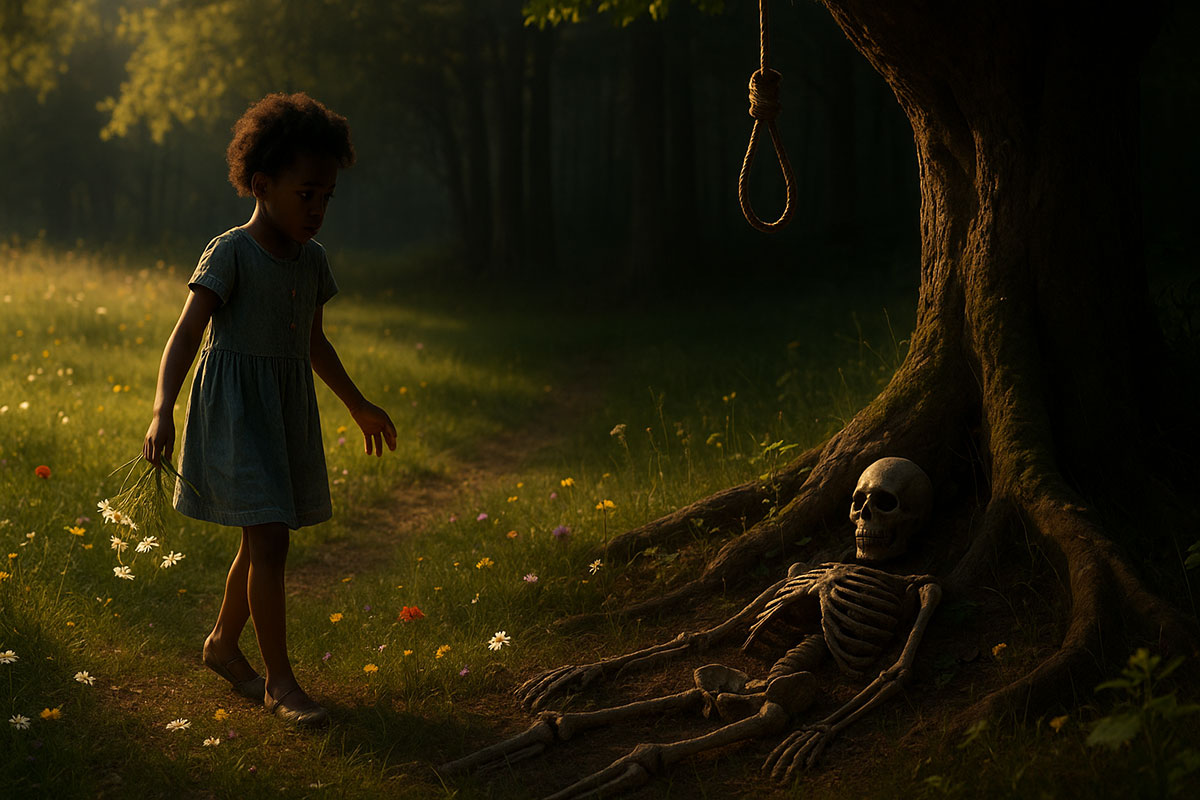
(The stage is divided into two spaces: stage left glows in golden light — a meadow alive with flowers; stage right is darkened, the forest looming. At the back, a single tall tree with a thick, frayed rope hangs barely visible, foreshadowing. Music: a faint hum of cicadas and birdsong. As the play begins, the meadow side is bright and alive. Myop, a small Black girl of about ten, enters barefoot, clutching a stick. She skips, humming softly, swinging the stick against the ground as though conducting an invisible orchestra.)
Myop (singing softly, skipping):
Sun is shining, flowers growing,
Mama’s cooking, breezes blowing…
(She giggles, bending down to pluck a handful of wildflowers. She tucks one behind her ear.)
Myop (to herself):
This one for Mama. This one for Daddy. And this one—this one’s mine.
(She holds the flower proudly to her chest. The light on the meadow shimmers warmly. She twirls, lets out a childish laugh, and swings her stick at an imaginary enemy.)
Myop:
And I’m the knight, brave and bold!
No dragon can get me—not in my meadow!
(She jumps, thrusts the stick in the air. She freezes mid-pose, triumphant, then bursts into laughter. She gathers more flowers, skipping closer to the shadow line of the woods. The meadow light fades gradually as she crosses into the forest side. The air shifts — birdsong dies down, replaced by faint rustling. She pauses, clutching her flowers tighter.)
Myop (quietly):
It got darker. Huh.
(She peers around, curious but slightly uneasy. She steps forward, her stick dragging across the forest floor. The trees appear taller, their shadows stretching across her. She stops to pick another flower, but it looks wilted.)
Myop (frowning):
Not so pretty. Maybe the sun forgot this place.
(A pause. She takes another step deeper. A faint creaking sound — almost like wood bending — echoes. She startles, glancing up. The rope sways slightly above in the branches, though not fully illuminated yet. She doesn’t see it.)
Myop (nervous laugh):
Just the trees talking. Daddy says woods like to whisper.
(She forces a smile, presses the flowers to her chest, and keeps walking. She kneels, noticing something odd on the ground — a cracked, weathered shoe half-buried in leaves. She tilts her head, picks it up slowly, brushing off dirt. She frowns, confused.)
Myop:
This don’t belong here…
(She drops the shoe. The meadow light behind her fades almost completely now. She is fully in shadow. Silence. A few steps forward — and she freezes. Her eyes widen. A faint spotlight falls on the forest floor downstage right: bones half-buried in leaves, a skull tilted sideways, and near it a single wild pink rose. The noose now glimmers faintly above in the tree. Myop gasps, covering her mouth. The flowers slip from her hand and scatter.)
Myop (whispering):
Oh.
(She approaches slowly, almost pulled against her will. She crouches near the skeleton, trembling. She reaches out a hesitant hand toward the rose but pulls back. Her breathing quickens. She stares at the noose above, then back at the bones. Her childish playfulness is gone; her face hardens in confusion, fear, and dawning awareness.)
Myop (very softly):
Who were you?
(She sits back on her heels, staring. Silence stretches. The meadow side of the stage is now completely dark. Only the dim, heavy light of the forest remains. She drops the last flower she still clutches. It falls slowly, landing beside the bones. As it touches the ground, all sound cuts — no cicadas, no rustling, only stillness. A narrator’s voice enters softly, almost whispered, carried over the silence.)
NARRATOR (voice-over):
And the summer was over.
(Blackout. End of Scene 1.)
Scene 2 — The Family Secret
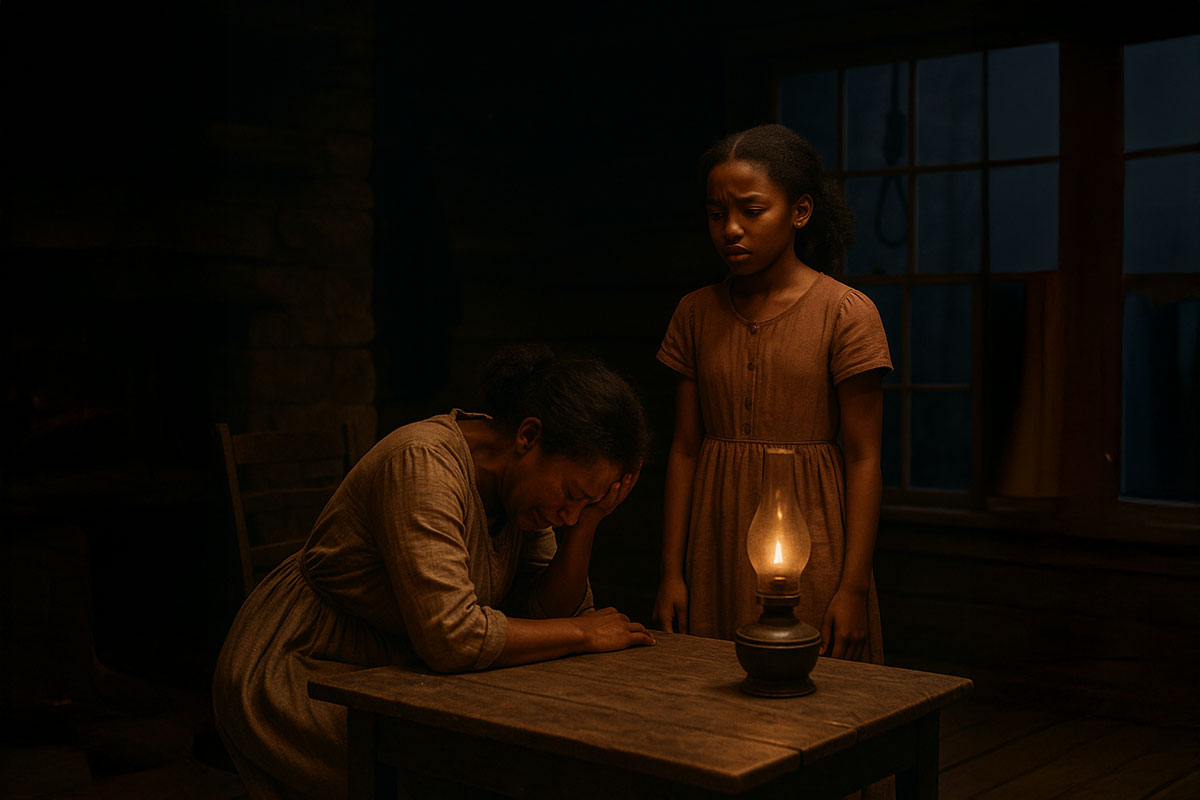
(The cabin interior. Evening light through the window, a bowl of beans on the table. MOTHER shells slowly, humming a tired hymn. Myop sits on the floor, her flowers clutched close. She looks distant. Outside, the sound of cicadas is fading. A storm is faintly gathering in the distance. Stage right: the forest shadow looms, the noose barely visible.)
MOTHER (noticing Myop’s silence):
Child, you’re quiet tonight. What’s stirrin’ in that little heart?
Myop (hesitant):
Mama… I saw somethin’. Out past the meadow.
(Mother looks up sharply, her hands stopping mid-shell. Myop takes a shaky breath.)
Myop:
It was… bones. A man’s bones. He had a rope above him, and a flower on the ground.
(Mother’s hands tremble. The beans fall from her grasp. She stands slowly, staring at Myop in horror.)
MOTHER (hoarse):
Where?
Myop:
In the woods. Where the trees get real dark.
(Mother presses a hand to her mouth, almost choking back a sob. She paces, wringing her hands, whispering to herself.)
MOTHER (broken):
All these years… all these years…
Myop (confused):
Mama?
(Mother turns, her eyes wet, voice shaking.)
MOTHER:
That man… he was your granddaddy.
(Myop freezes. Silence hangs heavy.)
Myop (barely audible):
Granddaddy…?
MOTHER (nodding, her voice cracking):
He went missin’ before you was born. They came one night, took him. Said he was too proud, too bold. And he never came back.
(She clutches her apron tightly, staring into the distance.)
MOTHER (continuing, breaking down):
I searched. I searched every path, every ditch, every holler. Thought maybe he’d run. Thought maybe he’d come home. But the woods swallowed him. I never found him.
(Myop’s flowers slip from her lap onto the floor. She stares at her mother, then toward the forest shadows.)
Myop (whispering):
I found him.
(Mother shudders, sinking into a chair, covering her face with both hands. Myop edges closer, her voice trembling.)
Myop:
He was there, Mama. Still there. Like he was waitin’ for someone to see.
(Mother sobs quietly, rocking herself. She looks at Myop with pained eyes.)
MOTHER (pleading):
Child, don’t go back. Please. The dead don’t rest easy, and the living got to keep on livin’.
Myop (firmly, a sudden strength):
But he’s my granddaddy. If you couldn’t find him, maybe I was meant to.
(A long silence. Mother trembles, torn between fear and recognition. Stage right, the faint outline of the GRANDFATHER’S ghost appears behind the noose, bathed in a soft, sorrowful glow. Myop turns her head, sensing it. She doesn’t cry — she stares with wide, steady eyes. Mother follows her gaze but sees nothing.)
Myop (whispering, almost to the ghost):
I won’t leave you there alone.
(The ghostly figure extends a hand toward her, then fades slowly back into shadow. Thunder rumbles louder outside. Mother grabs Myop’s shoulders, desperate.)
MOTHER:
You don’t understand, child! Knowing this… it changes you. It takes away the world you thought you had.
Myop (quiet but unshaken):
It already has.
(Silence. Mother stares at her, broken. The stage light dims except for a narrow beam over Myop, clutching her flowers again. The shadow of the noose stretches longer across the floor. Blackout.)
Scene 3 — The Weight of Blood
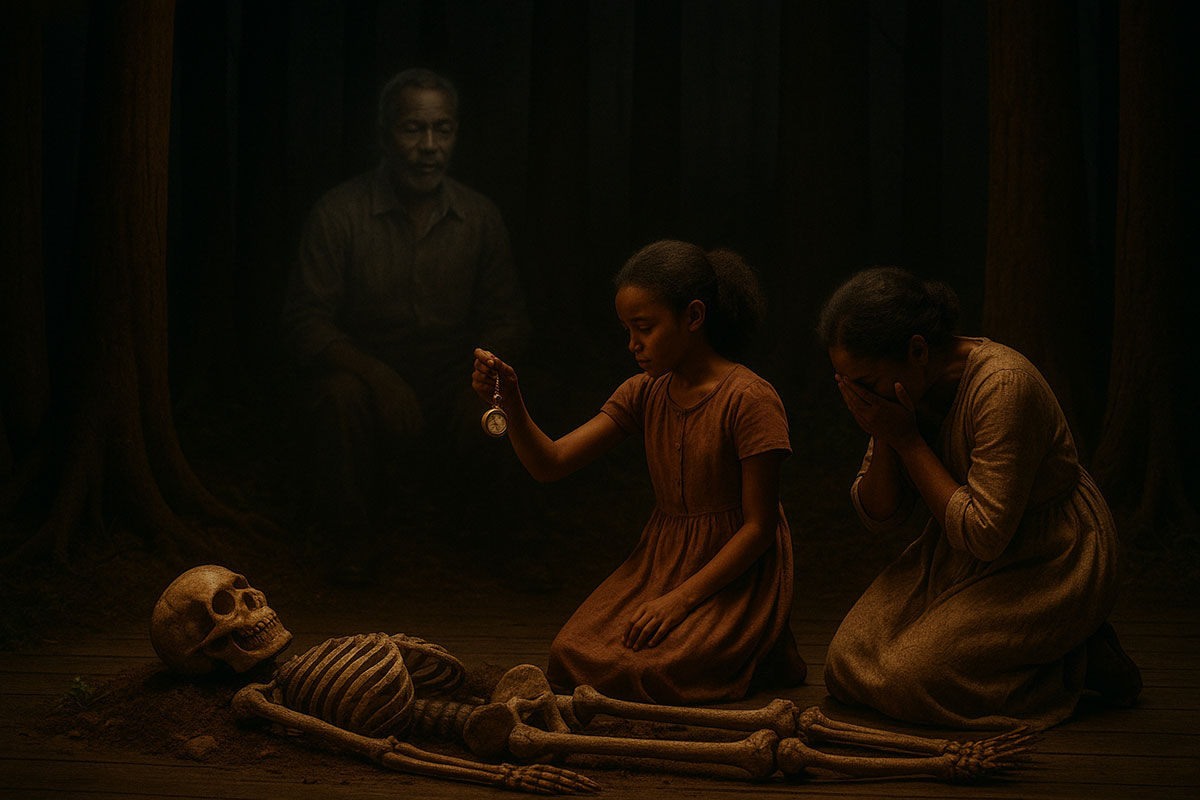
(The stage opens in the same forest clearing from Scene 1. Early morning light filters weakly through the trees. The air is still, heavy. The skeleton lies as before, faintly illuminated, the noose hanging above. The wild pink rose is now wilted. Myop enters slowly from stage left, barefoot, holding a small satchel. She looks both fearful and determined. The silence is broken only by distant bird calls. She pauses, gazing at the remains, then kneels carefully.)
Myop (softly):
I came back. Mama said not to, but… I couldn’t let you stay here alone.
(She opens the satchel and pulls out a piece of bread, placing it carefully near the bones.)
Myop (to the skeleton):
Granddaddy, I brought you somethin’ to eat. Mama always says no one should go hungry, not even the dead.
(She hesitates, then places one of her flowers beside the bread. She looks around the clearing, almost expecting a response. A long silence. She touches the ground near the skeleton and frowns. Half-buried in the soil is a pocket watch, rusted and cracked. She digs gently and lifts it up, brushing dirt from its face. She holds it close, her eyes wide.)
Myop (whispering):
This was yours… wasn’t it?
(A faint golden light flickers across the stage, almost like the sun breaking through the canopy. Behind Myop, the ghost of the GRANDFATHER appears faintly again, watching her. Myop doesn’t see him yet, but she shivers, sensing something. She clutches the watch to her chest.)
Myop (firmly):
I’ll keep it safe. I’ll keep you safe.
(She looks up at the noose, trembling.)
Myop:
They tried to take you away, but they didn’t. You’re still here. I can feel you.
(The ghost steps closer. Myop gasps and turns, finally sensing his presence. He is a tall, weary man, eyes full of sorrow but also gentleness. He doesn’t speak — his mouth moves, but no sound comes. Myop reaches toward him slowly.)
Myop (whispering):
Granddaddy…?
(The ghost nods faintly. He gestures toward the noose, then to the ground, then places a hand over his heart. Myop watches, tears forming.)
Myop (interpreting):
They hurt you… but your heart’s still here. With me.
(The ghost lowers his hand, looking at her with a mixture of pride and grief. Myop steps closer, holding out the watch. He places his hand above hers, though it passes through. She shivers, but doesn’t recoil. The light flickers warmly around them.)
Myop:
I’m not scared anymore.
(The ghost begins to fade. Myop cries out softly.)
Myop:
No, don’t go! Please—please don’t leave me yet.
(The ghost lingers just long enough to raise one finger to his lips — a gesture of silence, but not secrecy. Then he fades completely. The clearing grows darker again. Myop clutches the watch and falls to her knees, sobbing quietly. A pause. From stage left, MOTHER enters, frantic, searching. She sees Myop and freezes at the sight of the bones. Her face crumples. She falls to her knees beside her daughter.)
MOTHER (choking on her words):
You found him… You truly found him.
(Myop holds out the watch. Mother takes it with trembling hands, staring as if holding her husband’s heart. She presses it to her lips, tears streaming down her face. She rocks back and forth, whispering brokenly.)
MOTHER:
All these years… I searched, I prayed… and it was you who brought him back to me.
(She pulls Myop into her arms. They sit together in silence, clinging to each other, the skeleton beside them. After a long pause, Myop speaks softly, her voice steady.)
Myop:
Mama, he’s not gone. I saw him. He was right here.
(Mother shakes her head, half-believing, half-afraid.)
MOTHER:
Hush, child… don’t speak of spirits. It’ll haunt you.
Myop (firm):
He wanted us to know. He wanted us to remember.
(Mother looks at her daughter’s face and sees the conviction there. She trembles, then nods faintly, clutching the watch tighter. They sit together in silence, the stage bathed in a faint, sorrowful glow. Slowly, the sound of the storm from the end of Scene 2 rises again in the distance. The noose sways in the wind. Myop lays her head against her mother’s shoulder, whispering almost to herself.)
Myop:
I’ll carry him. His blood’s in me. I won’t let him be forgotten.
(Mother strokes her hair, weeping silently. The light fades until only the faint glow of the watch remains in Mother’s hand. Blackout.)
Scene 4 — The Storm of Memory
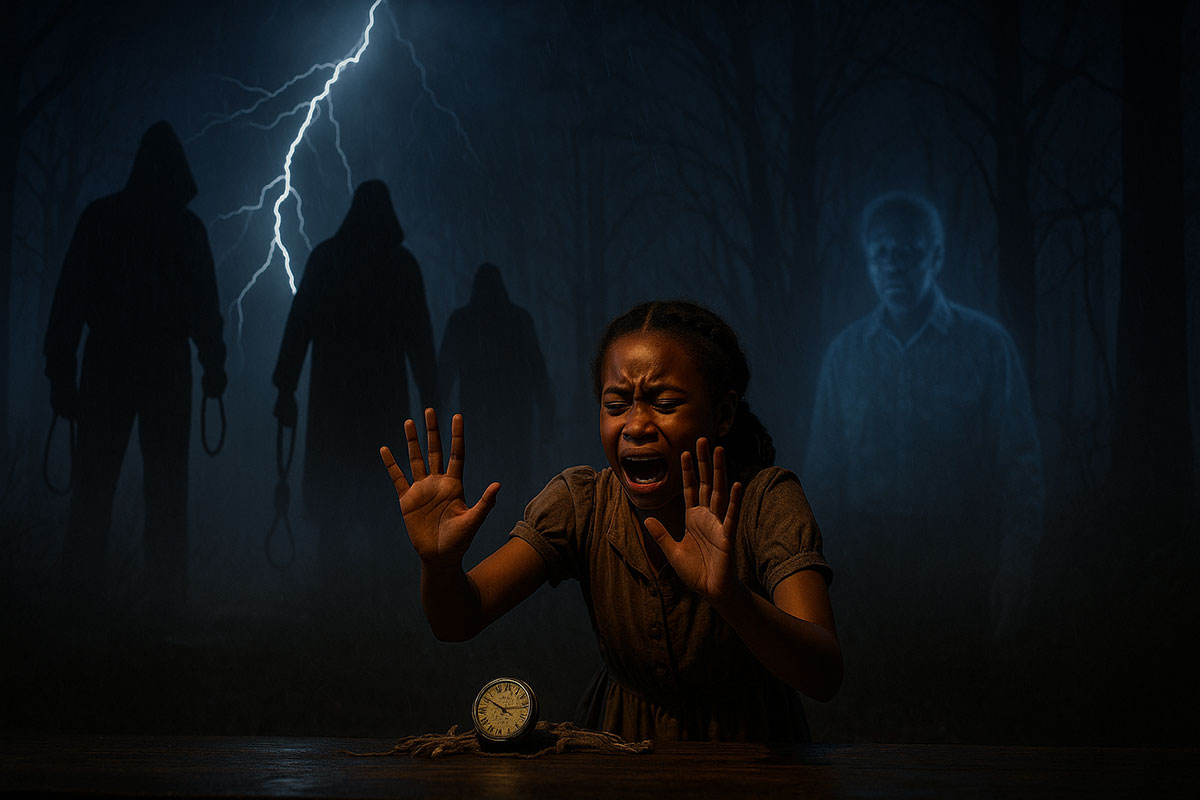
(The stage is dark. A low rumble of thunder shakes the silence. Lightning flashes briefly, illuminating the forest clearing. The skeleton is gone — replaced by an empty noose swaying violently from the tree. Myop lies asleep downstage, curled on the ground beside her mother’s lap. MOTHER sits slumped, exhausted, holding the pocket watch loosely. A single lantern flickers near them. Rain begins to patter faintly. As the lights dim, the soundscape grows louder: thunder, wind, the groan of trees. Myop stirs in her sleep. A new light — harsh, cold — spills across the stage as the dream begins.)
Myop (murmuring in sleep):
Granddaddy…
(In the dream space — stage right — the GRANDFATHER appears alive. He runs through the forest, panting, terrified. Shouts echo faintly: angry, indistinct voices of men. He stumbles, clutching his side. Myop rises slowly, drifting as if pulled into the dream, watching him. She is unseen by the men but visible to her grandfather. Lightning flashes, freezing the mob’s shadows across the backdrop. The sound of hounds barking grows faintly in the distance.)
Myop (calling out, desperate):
Granddaddy!
(The GRANDFATHER sees her, his face torn between terror and tenderness. He mouths words, but no sound comes. He gestures frantically for her to hide. She shakes her head, tears streaming.)
Myop:
I won’t leave you!
(Suddenly, the mob bursts into view as shadowy figures with torches and ropes. Their faces are obscured, their voices a chaotic chant. They surround the GRANDFATHER. He struggles, but they overpower him. Myop runs forward, but an invisible wall stops her. She slams her fists against it, screaming.)
Myop (screaming):
Stop! Stop! Please—he’s mine! He’s my blood!
(The mob ignores her. They drag the GRANDFATHER beneath the tree. Lightning reveals the noose clearly. They force it around his neck. Myop sobs, pounding on the invisible wall.)
Myop (pleading):
Take me instead! Don’t hurt him!
(The GRANDFATHER looks at her one last time. For the first time, his voice breaks through — faint, echoing, yet clear enough for her to hear.)
GRANDFATHER (whispering):
Remember me.
(The mob pulls the rope. The GRANDFATHER gasps, his body jerking. The sound of the storm crescendos — thunder crashes, rain pours. Myop collapses to her knees, wailing, clutching her chest as though feeling the noose tighten around her own neck. The mob fades into shadow, leaving only the swaying noose. The GRANDFATHER’S ghost hangs there briefly, then dissolves into light. Silence falls, except for soft rain.)
(Back in the waking world, MOTHER stirs, sensing her daughter thrashing. She shakes her gently.)
MOTHER (urgent, whispering):
Myop! Wake up, baby, wake up!
(Myop gasps awake, drenched in sweat, sobbing. She clings to her mother, trembling violently.)
Myop (sobbing):
Mama—I saw him… I felt it! They took him… I couldn’t stop it…
(Mother pulls her close, rocking her like an infant. Her voice breaks as she speaks.)
MOTHER:
Hush now, child. It wasn’t your fault. None of it was your fault.
(Myop pulls away slightly, gripping her mother’s arms, desperate.)
Myop (through tears):
But I felt it, Mama. The rope. His fear. It’s in me now.
(Mother strokes her hair, trembling. She lifts the pocket watch and presses it into Myop’s hands.)
MOTHER (softly):
Then carry him with this. Not with the pain, but with the love that made him ours.
(Myop stares at the watch, then looks up, her tears slowing. She holds it tight against her chest. A faint golden glow emanates from the watch, softening the storm. The rain sound quiets. The noose, once violent, now hangs still in silence. Myop’s face shifts from anguish to determination. She whispers firmly, almost like a vow.)
Myop:
I’ll remember. Always.
(Mother holds her close again. Both sit in silence as a soft light bathes them. The forest fades into shadow, leaving only the two figures and the watch’s faint glow. Blackout.)
Scene 5 — The Heir of Memory
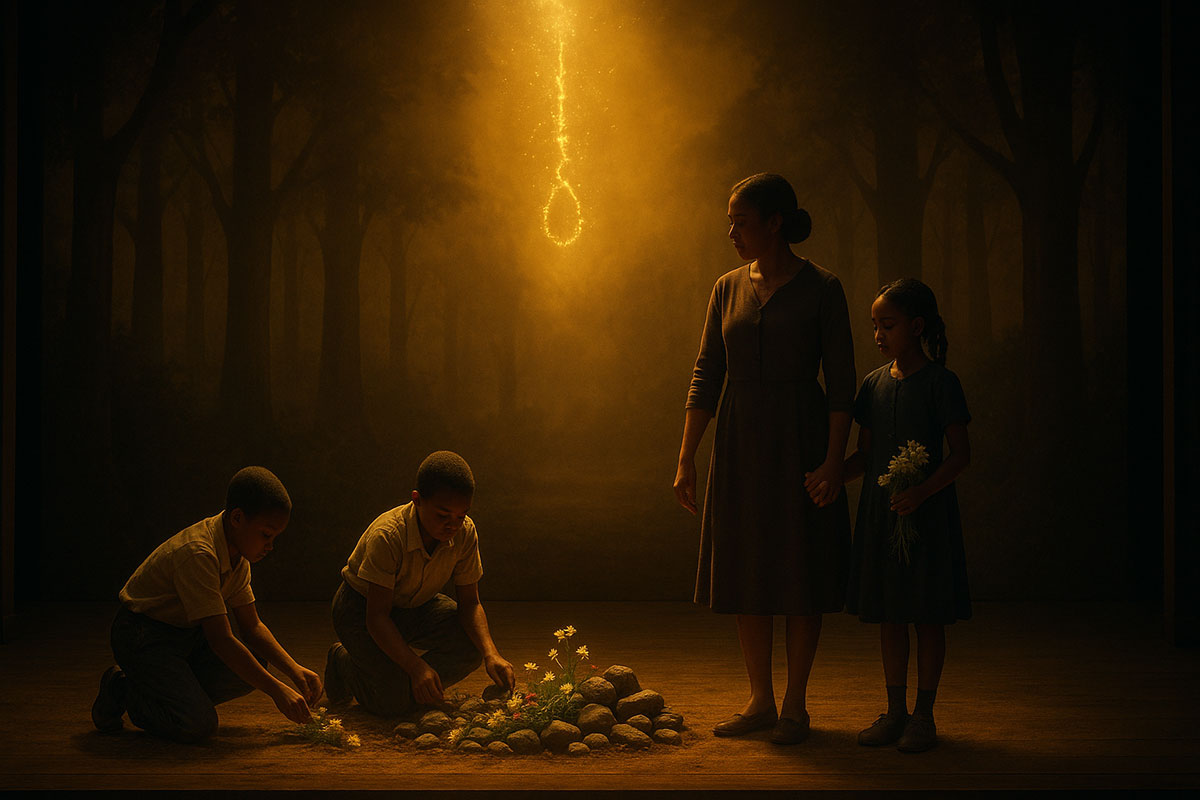
(The stage opens in the same forest clearing as before, but the mood is different. Morning light filters gently, calm after the storm. The skeleton remains, but it is now partially covered with earth and leaves, as if nature has begun reclaiming it. The noose still hangs, but it no longer sways. A sense of stillness fills the space. Myop enters slowly, holding the pocket watch and a bundle of fresh wildflowers. She walks with a steadiness far beyond her years.)
Myop (softly, to the clearing):
I came back, Granddaddy. Just like I promised.
(She kneels near the bones, arranging the flowers carefully around them — daisies, roses, clovers. She places the watch gently atop the flowers, resting it like a heart at the center of the memorial.)
Myop (whispering):
No more hiding. No more bein’ alone in the dark. You’re part of us again.
(She touches the ground tenderly, as though blessing it. From stage left, a group of CHILDREN enter — barefoot, carrying small handfuls of stones and petals. They approach hesitantly, whispering among themselves. One of them speaks up timidly.)
CHILD 1:
Myop… what you doin’?
Myop (firm, calm):
I’m rememberin’.
CHILD 2 (curious):
Who was he?
(Myop stands slowly, facing them. Her voice is steady, clear.)
Myop:
He was my granddaddy. They tried to take him away, but they couldn’t. ‘Cause I found him. And now we all remember him.
(The children look at one another. Slowly, they step forward and begin laying their stones and petals beside the flowers. The clearing fills with quiet reverence. One child starts humming a tune — a soft hymn. The others join. Myop kneels again, her hand resting on the memorial. The light grows warmer, brighter.)
(From stage right, MOTHER enters. She freezes at the sight — her daughter leading the children in an act of remembrance. Tears fill her eyes. She steps forward, kneels beside Myop, and places her hand on the flowers, trembling.)
MOTHER (softly, almost breaking):
I looked for him so long… and it’s you who gave him back to me.
(Myop turns to her, her expression calm but resolute.)
Myop:
We gave him back, Mama. Together.
(Mother nods, pulling Myop into a side embrace. She looks at the children, then the memorial, and her face softens with both grief and release. The faint golden glow seen in earlier scenes now spreads across the stage. Behind them, the GHOST of the GRANDFATHER appears once more, but this time he is peaceful, standing tall and proud. He looks at his daughter and granddaughter with love, then lifts his hand in blessing. Myop notices him and smiles faintly. Mother does not see him. The children pause, sensing something sacred.)
Myop (to the ghost, quietly):
Rest now. We’ll carry you.
(The ghost nods, then slowly dissolves into the light. The noose above fades away completely, leaving only the tree — alive, strong, unmarked. Silence falls, deep and reverent. Myop stands, looking at the children and then at her mother.)
Myop (with quiet strength):
He’s not just mine. He’s ours. And as long as we remember him, they can’t win.
(The children murmur agreement. Mother pulls Myop close again, whispering with pride.)
MOTHER:
You’re not just a child anymore. You’re the one who brought him home.
(A long silence. The light shifts to bathe Myop in a soft, golden glow, as if marking her transformation. The meadow soundscape faintly returns — birdsong, the hum of cicadas — but quieter now, more solemn. Myop lifts her head and speaks one final line, her voice firm and steady.)
Myop:
The summer’s over. But the remembering’s just begun.
(The stage freezes — Mother kneeling beside Myop, children gathered in reverence, flowers blooming around the memorial. The golden light grows until it fills the entire stage. Blackout.)
Final Thoughts

By the end, the meadow and the forest are no longer only places of fear and silence. They are transformed into a living memorial, a sacred ground where flowers and stones speak louder than forgotten violence. Myop, once a carefree child, becomes the keeper of her grandfather’s memory, holding his story so that others may never forget.
Alice Walker’s The Flowers captured the moment innocence ended. This reimagined play captures what follows: the long walk into remembrance, the inheritance of blood and memory, and the fragile hope that truth, once unearthed, can dissolve the shadows of silence.
As the noose fades into light, we are reminded that memory itself is resistance, and that even in the darkest woods, flowers can still bloom.
Short Bios:
Alice Walker
Alice Walker is an acclaimed American novelist, poet, and activist, best known for her Pulitzer Prize–winning novel The Color Purple. Her works often explore themes of race, gender, heritage, and resilience. Walker’s short story The Flowers (1973) is celebrated for its brevity and power, capturing the loss of innocence against the backdrop of racial violence in the American South.
Myop (Character)
Myop is the ten-year-old girl at the heart of The Flowers. Innocent and playful at the story’s start, she becomes a symbol of lost childhood when she stumbles upon the body of a lynched man. In this play adaptation, Myop’s journey deepens as she discovers the man is her grandfather, transforming her into a bearer of ancestral memory.
The Grandfather (Character)
The unnamed man whose remains Myop discovers represents the countless African Americans lynched during the Jim Crow era. In this adaptation, he is revealed as Myop’s grandfather, making the tragedy deeply personal. His presence, both skeletal and ghostly, embodies memory, injustice, and the call for remembrance.
The Mother (Character)
Myop’s mother carries the silent weight of grief. In the play, she represents generations of women who endured loss while protecting their children from painful truths. Her struggle between silence and revelation illustrates the tension between survival and the need to remember.
The Children (Characters)
The other children who join Myop in the final scene symbolize community and future generations. Their willingness to lay stones and flowers at the memorial shows how memory spreads — transforming private pain into shared legacy.

Leave a Reply